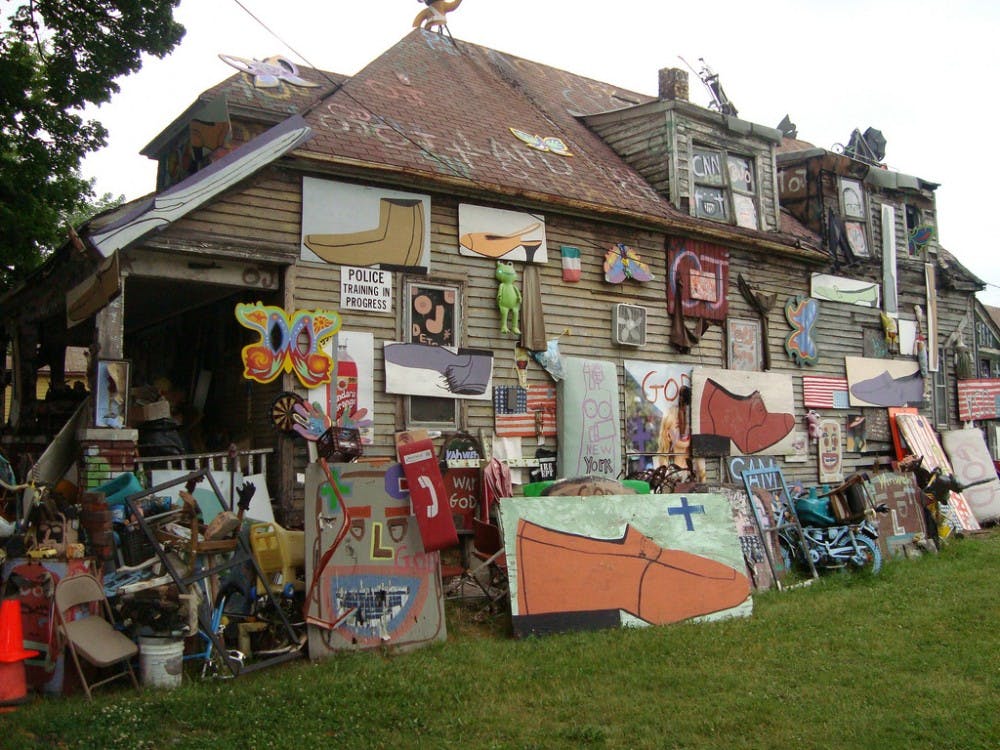COLUMN: Enforcing school art programs creates a better future

One of the houses featured in The Heidelberg Project, a community art piece that extends the whole length of Heidelberg Street in Detroit. Courtesy Photo | Heidelberg Project
Last year, the Detroit Free Press reported a staggeringly low number of Detroit public school systems offer class in art and music-- out of Detroit’s 81 public schools, only half have incorporated the arts into their curriculum.
This is a catastrophe at its is spreading through various states and communities. School systems in Chicago, Baltimore, and smaller communities in North Carolina are just a few more examples, according to The Washington Times.
The Association of American Educators examined the phenomena on a national scale and reported that "the drop was most prominent in drama, from 20 percent of schools offering drama in 1999 to just 4 percent in 2009." This number fluctuates but has yet to return to its former amount.
The ability to create is the foundation of being human. Some people prefer traditional art like painting or sculpting, some (including myself), dabble in music, and others exhibit small acts of creativity in their everyday lives, like tapping into your inner wordsmith to write an English paper or becoming your own personal fashion designer to pick out an outfit.
World Economic Forum predicts the future of corporate jobs will revolve around innovation and creativity, as new technology is being rapidly implemented into the workplace. Artists and creative thinkers draft the concept of the future and should be celebrated in America rather than extinguished. More importantly, the next generation should be well versed in different forms of artistry.
Innovative and imaginative individuals aren’t just the future of the corporate world: creative minds draft the concept of the future by providing services to their communities.
A familiar local example would be the Heidelberg Project, founded by Tyree Guyton and Executive director Jenenne Whitfield right in downtown Detroit. Extending the entire length of Heidelberg Street is a colorful collection of vacant homes all of which have been transformed into a riveting collection of artwork.
In 1986 Guyton found the street where he grew up battered and crumbling, riddled with drugs and violent crime. With wisdom from his grandfather, Guyton picked up a paintbrush rather than a gun and, with the help of the local youth, turned Heidelberg into what can be only be described, having seen it for myself, as a radiant explosion of character.
“The Heidelberg Project’s mission is to inspire people to appreciate and use artistic expression to enrich their lives and to improve the social and economic health of the greater community,” according to the organization’s website. Guyton and other local artists exemplify another core value of creativity, service to one’s community. For more than thirty years of renewing the human spirit, Heidelberg Project can now successfully translate into rebuilding a community.
Future projects, like the Heidelberg Project, will improve struggling communities all across the nation. That is if the next generation will be able to properly harness their creative abilities.
Business news provider, MarketWatch, published an article detailing Wisconsin College’s determination to eliminate over 11 different liberal arts majors, including English and History, from the offered curriculum. I, on the other hand, view the artist as one of the largest and most important cogs in the machinery that is American society.
The most important questions are raised by the creative thinker, or the artist. Their creative energy is expressed in many different formats and reaches every person at every corner of the planet. When used effectively, a creative mind will bring people together by translating the deepest and most primal emotions into a physical interpretation. Art and creativity as a whole are not only craved by leaders and innovators but also improves the quality of everyday life.
In modern American society, nothing is more important than having a citizenship of creative thinkers to bring about the solutions of long withstanding issues. That's why it's unacceptable that opportunities for young minds to tap into their artistic potential are being taken away from them. This must be fought in order to promote a thriving image of the future.
I don't want to live in a world without artists.






